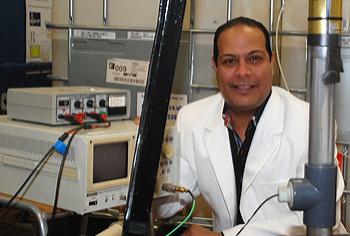Pumps are at the heart of industry
Fri, 22 Feb 2013 11:33:00 GMT
Saudi researcher’s diagnostic role on centrifugal pumps
PUMPS are at the heart of industry and it can be catastrophic when they fail. This means it is highly important to detect and prevent problems before they develop and the research speciality of Dr Faisal Al Thobiani at the University of Huddersfield is playing an important diagnostic role.
Dr Al Thobiani (pictured below) – newly-appointed as a research fellow within the University’s Centre for Efficiency and Performance Engineering – recently completed his PhD project in which he investigated non-intrusive methods for detecting the early signs of cavities in centrifugal pumps.
 His techniques include the use of sensors to detect vibrations, which are a sign of incipient problems. Many industries can benefit from his research – not least the oil industry that dominates his native Saudi Arabia.
His techniques include the use of sensors to detect vibrations, which are a sign of incipient problems. Many industries can benefit from his research – not least the oil industry that dominates his native Saudi Arabia.
His early education and varied industrial experience took place in his homeland. For example, Dr Al Thobiani worked as a maintenance engineer at the King Abdul Aziz University. He also taught engineering subjects at the Jeddah College of Technology.
But he came to the UK for postgraduate degrees, first an MSc in Advanced Control and Systems Engineering at the University of Manchester, and then to Huddersfield for his recently-awarded PhD. He sought the supervision of the University’s Professor Andrew Ball, a leading expert in the field of diagnostic conditioning monitoring, and now he is a member of the Centre for Efficiency and Performance Engineering, a research group headed by Professor Ball.
“I chose to further my knowledge and study at Huddersfield because I wanted to work under the direction of Professor Ball, who is an expert in the field of detection and diagnostic engineering,” said Dr Al Thobiani. “I had looked at other institutions, but the diagnostic facilities at Huddersfield are excellent and this made my decision easy.
Dr Al Thobiani continues to work on the problem of cavitation, the single most important problem in pumps, caused by a number of potential factors. He aims to add to his list of academic publications, which already includes jointly-authored articles on cavitation and failure detection.
“When I return to Saudi, after completing my research, I am planning on working in education or industry and providing students or colleagues with the knowledge that I have learnt from my time in the UK,” he added.







